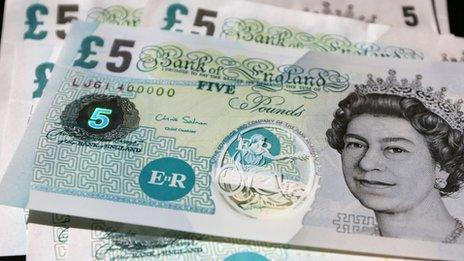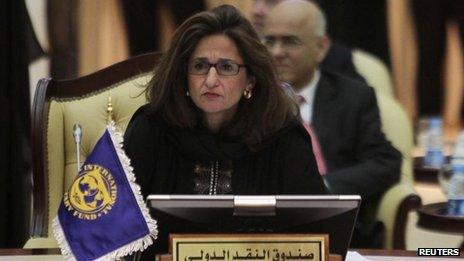Bank of England announces major reorganisation
- Published
Mark Carney talks about risks in the banking system
Two new deputy governors have been named at the Bank of England, as part of a radical shake-up by governor Mark Carney.
Ben Broadbent will become deputy governor responsible for monetary policy, and Nemat Shafik will take charge of markets and banking.
Both will sit on the rate-setting monetary policy committee (MPC).
And Andy Haldane, executive director for financial stability, will swap jobs with chief economist Spencer Dale.
The appointments, external are the first of several changes being made as part of what Mr Carney has said will be a "root-and-branch" review of how the Bank conducts market intelligence, following criticism of its response to claims of manipulation of foreign exchange (forex) rates.
In a speech, external at Cass Business School Mr Carney set out his vision for the Bank.
He said the financial crisis was a "powerful reminder" that to maintain economic stability the Bank had to do more than just fight inflation.
Initiatives
To do that Mr Carney has set out fifteen initiatives, external to reshape the Bank.
They include the creation of Ms Shafik's Deputy Governor role to oversee markets and banking.
Also, the responsibilities of the chief economist will be expanded to help improve the Bank's collection of data.
Victoria Cleland has been named as the Director for Banknotes and Chief Cashier, replacing Chris Salmon.
The appointment means Ms Cleland's name will appear on banknotes.

Victoria Cleland will be the next chief cashier name to appear on banknotes
Philip Shaw, chief economist at Investec, said the dramatic changes indicated the extent of the changes Mr Carney planned to make.
"He's serious about making reform, not only to the structure of the Bank... but also in terms of its culture," he said.
'Pretty tough'
Ben Broadbent, who takes over from the retiring Charlie Bean on 1 July, will now be responsible for the Bank's analysis of the UK economy.
Ms Shafik, an International Monetary Fund official, will become the first female MPC member since 2010 when she replaces executive director for markets, Paul Fisher, on 1 August.
She will be in charge of the Bank's eventual exit from its quantitative easing policy, which it has so far used to inject £375bn into the economy by buying government bonds.
Ms Shafik will also lead the Bank's review on its market intelligence, which has come under attack after claims some Bank officials knew about the alleged fixing of foreign exchange rates.

Nemat Shafik will take charge of markets and banking
Jonathan Portes, director of Britain's National Institute for Economic and Social Research said that she is a good person to monitor the financial industry.
"She's pretty tough and at the moment you need someone who is prepared to be fairly tough with the London financial sector," he said.
'Well-rounded'
In other changes, Anthony Habgood was named as chairman of the Bank's supervisory body, the Court of Directors, whose role will be to oversee Mr Carney's governance, including the Bank's adherence to official rules on how it operates.
"These appointments result in a well-rounded senior management team at the Bank - one that will set the direction for an ambitious agenda of transformation," said Mr Carney.
BNP Paribas economist David Tinsley said the appointments would add "a degree of raised uncertainty" about when the central bank would start to raise interest rates from their current 0.5% record low.
Mr Carney has also given the Bank a new mission statement: "Promoting the good of the people of the United Kingdom by maintaining monetary and financial stability."
- Published18 March 2014
- Published11 March 2014
- Published12 March 2014
- Published11 March 2014